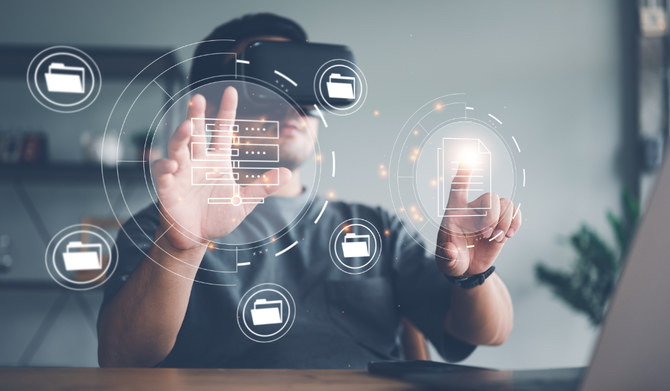DUBAI: The term “metaverse” became as ubiquitous as Facebook when the social media platform’s parent company rebranded itself as Meta last year, signaling its vision for the future of the company.
Meta aims to reach a billion people through the metaverse within the next 10 years and it has made numerous investments in the past year alone to help realize that ambition.
From startups to major conglomerates, a wide range of businesses are already making significant investments in the metaverse. This in hardly surprising given that the metaverse economy will be worth an estimated $360 billion in the Middle East and North Africa and Turkey, and more than $3 trillion dollars globally, within a decade, according to consultancy Analysis Group.
“We don’t know what the metaverse economy will look like yet but it’s hard to imagine the direction of travel will change,” said Derya Matras, Meta’s vice-president for the Middle East, Africa and Turkey.
Meta is already working on making the metaverse more accessible, she said, through tools such as Horizon Workrooms, Portal and Workplace, which will “form building blocks and entry points for the metaverse at work.”
This means the metaverse will be accessible from any device, from virtual reality headsets and desktop computers to mobile devices and smart glasses.
In an exclusive interview, Matras shared the company’s plans for the sector it renamed itself after.

Derya Matras, vice-president for Middle East, Africa and Turkey at Meta.
What value does the metaverse hold for businesses and consumers that cannot be offered by other media or channels?
Bringing the metaverse fully to life is still about a decade away, although you can experience glimmers of it today. Once fully materialized, it will open a completely new set of opportunities where human interaction will be elevated to a new level.
Of course, nothing beats being together in person but in times when it’s not possible, the metaverse will get us pretty close. Interactions will become more embodied and immersive.
We’re expecting the metaverse to be completely transformative in many areas of life, such as business, education, work and healthcare.
For business, our expectation is that within the next decade, the metaverse will reach 1 billion people, host hundreds of billions of dollars of digital commerce, and support jobs for millions of creators and developers.
Another key area I am excited about is education. The metaverse could revolutionize the way we learn. We will be able to learn by doing and not just passively absorbing information.
The metaverse also has the power to completely transform the world of work.
How does Meta aim to make the metaverse more accessible to audiences?
The metaverse is all about bringing the world closer together, and that’s also our company’s mission. Making the metaverse accessible to more people is the key to its success. That relies on improving access to reliable internet, hardware and experiences.
While we are at the start of this journey and a lot of infrastructure still needs to be built, we have already taken many steps in this direction. We are investing in getting more people access to fast and reliable internet, and supporting programs and research focused on making the metaverse accessible to more people.
For instance, in 2020 we announced the 2Africa subsea cable, which will provide nearly three times the total network capacity of all the subsea cables serving Africa today. Last year, the consortium added several new locations for the cable in Oman, the UAE, Qatar, Bahrain, Kuwait, Iraq, Pakistan, India and Saudi Arabia.
We are also building the metaverse in a way that will be accessible through many entry points, including through mobile phones and the apps people use today.
At a time when regulation of social media — which has been around for over a decade — is still under scrutiny, what are your thoughts on the regulation of the metaverse?
The question of regulation is extremely important because if our vision is to have a billion people accessing the metaverse as part of their daily lives within 10 years, we need to invest a lot of resources into making it a safe and secure place.
That is why we have established the Extended Reality Programs and Research Fund, a two-year, $50 million investment in programs and external research geared toward building the metaverse responsibly.
Collectively, we can think of this process as developing a system of governance for the metaverse that will address how the technologies and environments for the metaverse can be developed in safe, secure, interoperable and inclusive ways.
To us, investing in the metaverse means investing resources toward safety and security. And it mustn’t be shaped by tech companies, like Meta, on their own. It needs to be developed openly with a spirit of cooperation between the private sector, lawmakers, civil society, academia, and the people who will use these technologies.
One such multi-stakeholder initiative, called “Defining and Building the Metaverse,” was launched this year at the World Economic Forum and it focuses on two key areas: governance of the metaverse, and economic and societal value.
With more and more businesses going digital — and, now, virtual in the metaverse — is there a threat to physical businesses?
This isn’t about spending more time on screens. Real-life interaction is always better but we are often limited by space and time to enjoy such moments whenever we want. Our vision for the metaverse is about enhancing our experiences, not replacing in-person contact.
It’s ultimately about finding ever-more ways for the benefits of the online world to be felt in our daily lives, enriching our experiences not replacing them.
Digital transformation will only be enhanced by the metaverse. It will be possible to create more immersive, more social, more detailed experiences than ever before, all from your living room, or your spare room, or garage, or wherever it is you do your Zoom meetings.


























